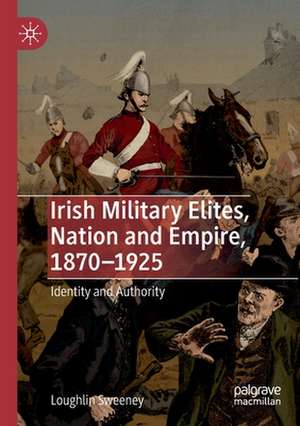Irish Military Elites, Nation and Empire, 1870–1925: Identity and Authority
Autor Loughlin Sweeneyen Limba Engleză Paperback – 16 aug 2020
| Toate formatele și edițiile | Preț | Express |
|---|---|---|
| Paperback (1) | 582.63 lei 6-8 săpt. | |
| Springer International Publishing – 16 aug 2020 | 582.63 lei 6-8 săpt. | |
| Hardback (1) | 592.95 lei 6-8 săpt. | |
| Springer International Publishing – 15 aug 2019 | 592.95 lei 6-8 săpt. |
Preț: 582.63 lei
Preț vechi: 685.45 lei
-15% Nou
Puncte Express: 874
Preț estimativ în valută:
111.48€ • 116.71$ • 92.25£
111.48€ • 116.71$ • 92.25£
Carte tipărită la comandă
Livrare economică 05-19 aprilie
Preluare comenzi: 021 569.72.76
Specificații
ISBN-13: 9783030193096
ISBN-10: 3030193098
Pagini: 301
Ilustrații: XVII, 301 p. 12 illus., 7 illus. in color.
Dimensiuni: 148 x 210 x 22 mm
Greutate: 0.38 kg
Ediția:1st ed. 2019
Editura: Springer International Publishing
Colecția Palgrave Macmillan
Locul publicării:Cham, Switzerland
ISBN-10: 3030193098
Pagini: 301
Ilustrații: XVII, 301 p. 12 illus., 7 illus. in color.
Dimensiuni: 148 x 210 x 22 mm
Greutate: 0.38 kg
Ediția:1st ed. 2019
Editura: Springer International Publishing
Colecția Palgrave Macmillan
Locul publicării:Cham, Switzerland
Cuprins
1 Introduction.- 2 Defining an Irish military elite.- 3 'One ought to do what one can for people in his circ.': Patronage and affinity among Irish military elites.- 4 Ireland's imperial moment: Wolseley and Roberts in command.- 5 Aid to the civil power: The military establishment, the Land War, and the Home Rule crisis, 1882-1914.- 6 Status quo ante bellum: The Irish military establishment in 1914.- 7 Irish officers in the Great War.- 8 The Irish military elite and the War of Independence 1918-1922.- 9 Barriers Broken: Partition, the Free State, and Empire,1922–25.- 10 Conclusion.
Notă biografică
Loughlin Sweeney is Assistant Professor at the John Endicott College of International Studies in South Korea, where he lectures on global history and researches Irish communities in the nineteenth-century Pacific. He conducted this research while pursuing a doctorate at Queens’ College Cambridge, awarded in 2017. Since then, he has been a visiting fellow at Queen Mary, University of London, UK and the University of Edinburgh, UK, and he publishes regularly in the fields of Irish history, the British Empire, the Irish diaspora, and imperial, colonial, and postcolonial studies.
Textul de pe ultima copertă
“Dr Sweeney’s important book brings to life the experience of the Irish officer class at a time of building revolutionary ferment. It is an astute and original study that sits at the boundaries of so many fields, from the national question to matters of gender and class.”
—John Bew, War Studies, King’s College London, UK
This book is a social history of Irish officers in the British army in the final half-century of Crown rule in Ireland. Drawing on the accounts of hundreds of officers, it charts the role of military elites in Irish society, and the building tensions between their dual identities as imperial officers and Irishmen, through land agitation, the home rule struggle, the First World War, the War of Independence, and the partition of Ireland. What emerges is an account of the deeply interwoven connections between Ireland and the British army, casting officers as social elites who played a pivotal role in Irish society, and examining the curious continuities of this connection even when officers’ moral authority was shattered by war, revolution, independence, and a divided nation.
—John Bew, War Studies, King’s College London, UK
This book is a social history of Irish officers in the British army in the final half-century of Crown rule in Ireland. Drawing on the accounts of hundreds of officers, it charts the role of military elites in Irish society, and the building tensions between their dual identities as imperial officers and Irishmen, through land agitation, the home rule struggle, the First World War, the War of Independence, and the partition of Ireland. What emerges is an account of the deeply interwoven connections between Ireland and the British army, casting officers as social elites who played a pivotal role in Irish society, and examining the curious continuities of this connection even when officers’ moral authority was shattered by war, revolution, independence, and a divided nation.
Caracteristici
Examines the social history of the Irish military during the last fifty years of British rule in Ireland Draws on public and private written sources from hundreds of Irish military officers Explores the tensions between class and social position, political power and legitimacy and the role of national identity in maintaining symbolic authority
